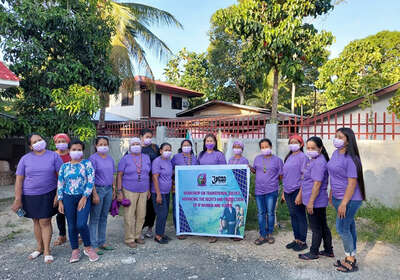Publication: From Transition to Transformation
Making peace processes more gender-sensitive

The landmark UN Security Council Resolution 1325 on Women, Peace and Security (WPS) was passed in 2000. In the 25 years since then, more than 110 countries have adopted a National Action Plan for the implementation of the resolution, highlighting the potential of the WPS agenda as an instrument for transformative change.
Resolution 1325 is a global call for women’s full and meaningful participation in peace processes to end armed conflict and in shaping and maintaining peace. Resolution 1325 and its nine additional resolutions make up the WPS agenda. By adopting the resolution, governments are called upon to look at conflict and peace in a new way, “beyond the warring parties and traditional powerbrokers – both dominated by men, even today” (UN Women).
However, the agenda and its implementation are also subject to criticism from feminist academics and practitioners. Criticisms include: an essentialist understanding of gender through the focus on women; the understanding of women as "passive victims" and as inherently peaceful and therefore better suited to participate in peace processes; and the lack of enforceability of the agenda.
Further criticism is that the practical application of the WPS agenda often focuses on quotas, e.g. on the proportion of women participating in peace negotiations, rather than on the meaningful contribution of women to the negotiations. Another criticism is that WPS practice does not change patriarchal structures and discriminatory systems.
More than 110 countries have developed National Action Plans (NAPs) for the implementation of the agenda, including Switzerland. The orientation that countries give to the agenda is usually related to their geopolitical situation. While countries of the so-called Global South implement the WPS agenda domestically, countries of the so-called Global North focus their NAPs almost exclusively on their foreign policy. This is also one of the points of criticism that we, together with our cooperation partners, repeatedly raise in the civil society monitoring of the Swiss NAP.
Nevertheless, the agenda still has the potential to be used as an instrument for transformative change, both in Switzerland and in countries and regions affected by war and conflict.
Switzerland's 4th National Action Plan (NAP) for the implementation of UN Security Council Resolution 1325 recognises the need for and value of women's effective participation in peace and political processes for conflict prevention. It also recognises that certain socio-economic conditions must be in place to enable this participation.
On the occasion of the extension of the current Swiss NAP 1325 until the end of 2024, we initiated the project "Alliance for Women, Peace and Security: Channelling Civil Society Voices into the WPS Agenda" in summer 2022 in an alliance with KOFF swisspeace and the feminist peace organisation Frieda. An important goal: to increase the relevance and visibility of the WPS agenda and the Swiss NAP 1325 in the Swiss administration, civil society and the interested public in Switzerland.
Defining and carrying priorities into the NAP
The project builds on the findings of the previous project "Civil Society Contribution to the Implementation of the Swiss National Action Plan 1325" (2018-2022). It also uses the co-chairship of Switzerland and South Africa in the WPS Focal Point Network (WPS FPN) in 2022 and Switzerland's non-permanent seat on the UN Security Council as learning opportunities in the preparation of the 5th Swiss NAP 1325.
The project also aims to promote dialogue within civil society and with relevant actors in the Swiss administration so that civil society concerns are included in the 5th Swiss NAP. To this end, the Alliance held the webinar "Memory and Transformation" in March 2023 and the webinar "Demilitarisation and Protection from Gender-Based Violence". These opportunities for joint learning and dialogue within civil society promoted practical expertise and awareness of the WPS agenda and the Swiss NAP 1325.
Public hearings and presentation to government
Finally, two public hearings with representatives from Swiss civil society and academia were held in September and November 2023 to develop recommendations for the 5th NAP 1325. In total, people with links to over 20 civil society organisations and universities participated. Based on the findings from the webinars and the hearings, the Alliance then drafted the report "UN Resolution Women, Peace, Security: Civil Society Priorities for the 5th Swiss National Action Plan". The Alliance presented the report to the Federal Administration in May 2024 at an exchange with representatives of the federal government.
In the further course of the project, the alliance specifically put forward its key points in direct dialogue with the Federal Administration during the concrete formulation of the new NAP.
The publication of the new Swiss NAP marks the end of the project (expected in summer 2025). A follow-up project is being planned.